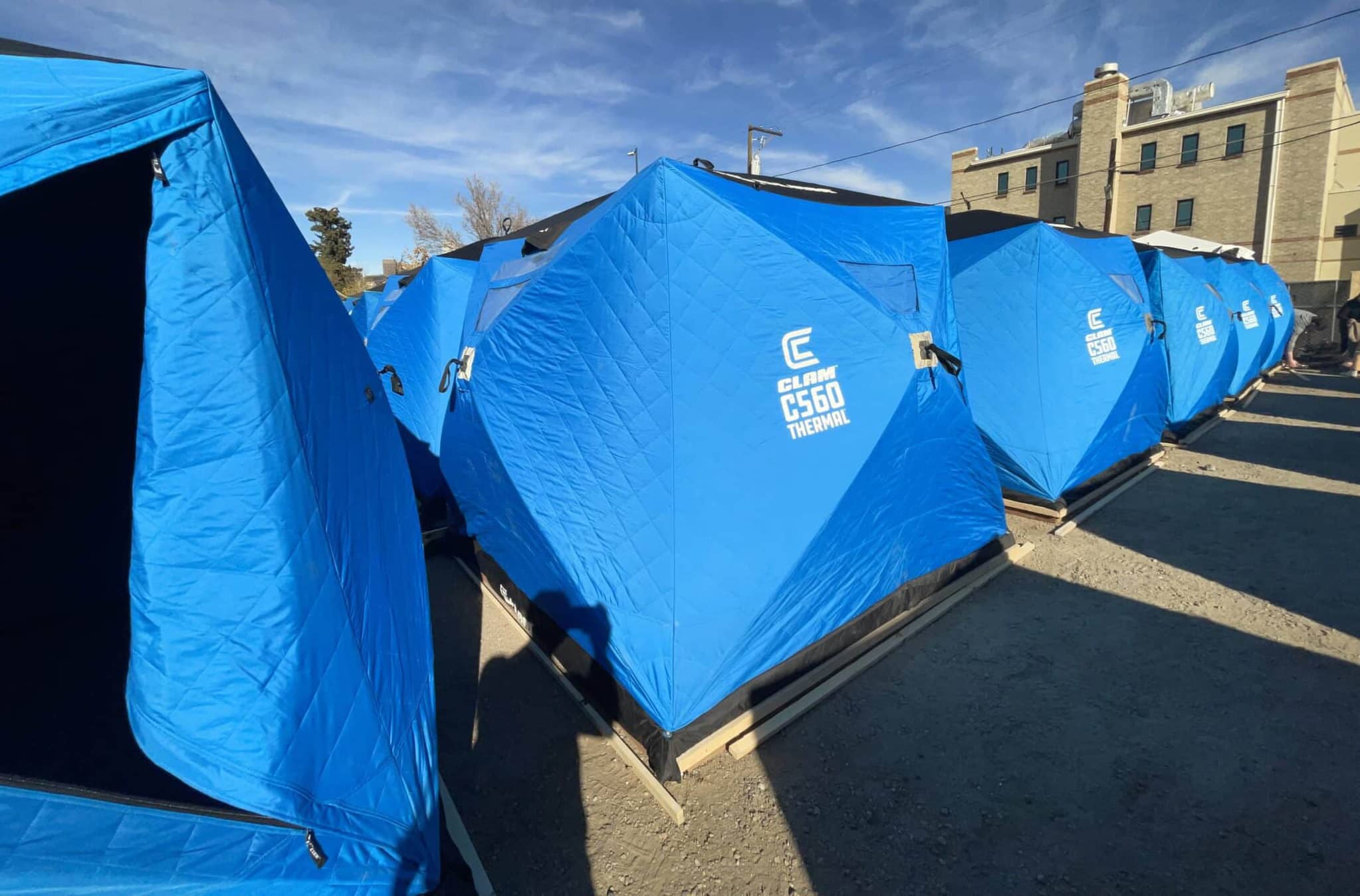
Tents in a campsite that was previously located at the corner of 8th Avenue and Elati Street in Lincoln Park. (BusinessDen file)
A lot in a largely industrial stretch of Lincoln Park is poised to be the next in Denver to host a sanctioned homeless camp.
Colorado Village Collaborative plans to establish a 60-tent facility in the parking lot at 1530 W. 13th Ave., according to the nonprofit’s website. It would house up to 70 people and operate for two years starting June 1, with the potential to be extended.
CVC has operated the campsites, which it calls “safe outdoor spaces,” in about eight locations since late 2020. Individuals reside in ice-fishing tents and have access to bathrooms. The camps, which are staffed 24/7, generally operate at a site for six months to two years, and have been located on a mix of municipal and private land. Private landowners that have hosted camps include Denver Health, Regis University and multiple churches.
The Lincoln Park property is owned by Denver-based Shanahan Development, which paid $5.75 million in late March for the 1.4-acre site, which was previously used by Savio House, a children’s therapy nonprofit.

Jeff Shanahan
Shanahan plans to eventually build income-restricted housing on the site, but needs to be awarded competitive tax credits in order to start work.
Owner Jeff Shanahan said the idea for hosting a camp was actually proposed by the city, which awarded him $5.5 million in federal funds to help fund the March acquisition. He toured the property with CVC about two weeks prior to closing.
“I thought it was a good match,” Shanahan said, adding he doesn’t expect to break ground at the site for two years.
Some CVC camps, particularly ones in more residential areas of the Lincoln Park and Park Hill neighborhoods, have encountered pushback from nearby residents. The 13th Avenue property is more than a block from the closest apartments.
CVC has a new leader as of March. Denise “Dede” de Percin, who most recently worked as executive director of the Mile High Alliance, is the permanent replacement for CVC founder Cole Chandler, who left the organization last year for a state job.
De Percin said in an email that the property will house more than just the camp.
“This site has office space, so once the SOS is settled, we’ll also be moving CVC’s administrative offices to 1530 W. 13th Ave.,” she said.
The camps were initially established as a response to the pandemic, but city officials have since embraced them as a longer-term response to the number of people living on Denver’s streets.
Temporary language in the city’s zoning code that has allowed the camps is set to expire at year-end. The Hancock administration, however, is looking to legalize the camps beyond that by changing zoning code to treat them similar to tiny home villages, which feature more durable structures and are also used to house the homeless.
The proposed new language would allow a camp to operate at a single location for up to four years.
In March, the city approved $7.53 million in spending to fund CVC’s campsite program through 2024, bringing the total amount of tax dollars spent on it to more than $12 million, according to Denver7.
Three camps currently operate in Denver. Two, at 3815 Steele St. in Clayton and 4685 Peoria St. in Montbello, are on city-owned property. The last, at 221 Federal Blvd., is on land owned by the Episcopal Diocese-affiliated St. Francis Center, and is slated to close at the end of this month, according to CVC’s website.
Denver otherwise bans camping on streets, sidewalks and parks, although clusters of tents are common and enforcement is typically limited to occasionally forcing campers to move to another area.
Editor’s Note: This story has been updated with a comment from CVC leadership.

Tents in a campsite that was previously located at the corner of 8th Avenue and Elati Street in Lincoln Park. (BusinessDen file)
A lot in a largely industrial stretch of Lincoln Park is poised to be the next in Denver to host a sanctioned homeless camp.
Colorado Village Collaborative plans to establish a 60-tent facility in the parking lot at 1530 W. 13th Ave., according to the nonprofit’s website. It would house up to 70 people and operate for two years starting June 1, with the potential to be extended.
CVC has operated the campsites, which it calls “safe outdoor spaces,” in about eight locations since late 2020. Individuals reside in ice-fishing tents and have access to bathrooms. The camps, which are staffed 24/7, generally operate at a site for six months to two years, and have been located on a mix of municipal and private land. Private landowners that have hosted camps include Denver Health, Regis University and multiple churches.
The Lincoln Park property is owned by Denver-based Shanahan Development, which paid $5.75 million in late March for the 1.4-acre site, which was previously used by Savio House, a children’s therapy nonprofit.

Jeff Shanahan
Shanahan plans to eventually build income-restricted housing on the site, but needs to be awarded competitive tax credits in order to start work.
Owner Jeff Shanahan said the idea for hosting a camp was actually proposed by the city, which awarded him $5.5 million in federal funds to help fund the March acquisition. He toured the property with CVC about two weeks prior to closing.
“I thought it was a good match,” Shanahan said, adding he doesn’t expect to break ground at the site for two years.
Some CVC camps, particularly ones in more residential areas of the Lincoln Park and Park Hill neighborhoods, have encountered pushback from nearby residents. The 13th Avenue property is more than a block from the closest apartments.
CVC has a new leader as of March. Denise “Dede” de Percin, who most recently worked as executive director of the Mile High Alliance, is the permanent replacement for CVC founder Cole Chandler, who left the organization last year for a state job.
De Percin said in an email that the property will house more than just the camp.
“This site has office space, so once the SOS is settled, we’ll also be moving CVC’s administrative offices to 1530 W. 13th Ave.,” she said.
The camps were initially established as a response to the pandemic, but city officials have since embraced them as a longer-term response to the number of people living on Denver’s streets.
Temporary language in the city’s zoning code that has allowed the camps is set to expire at year-end. The Hancock administration, however, is looking to legalize the camps beyond that by changing zoning code to treat them similar to tiny home villages, which feature more durable structures and are also used to house the homeless.
The proposed new language would allow a camp to operate at a single location for up to four years.
In March, the city approved $7.53 million in spending to fund CVC’s campsite program through 2024, bringing the total amount of tax dollars spent on it to more than $12 million, according to Denver7.
Three camps currently operate in Denver. Two, at 3815 Steele St. in Clayton and 4685 Peoria St. in Montbello, are on city-owned property. The last, at 221 Federal Blvd., is on land owned by the Episcopal Diocese-affiliated St. Francis Center, and is slated to close at the end of this month, according to CVC’s website.
Denver otherwise bans camping on streets, sidewalks and parks, although clusters of tents are common and enforcement is typically limited to occasionally forcing campers to move to another area.
Editor’s Note: This story has been updated with a comment from CVC leadership.
